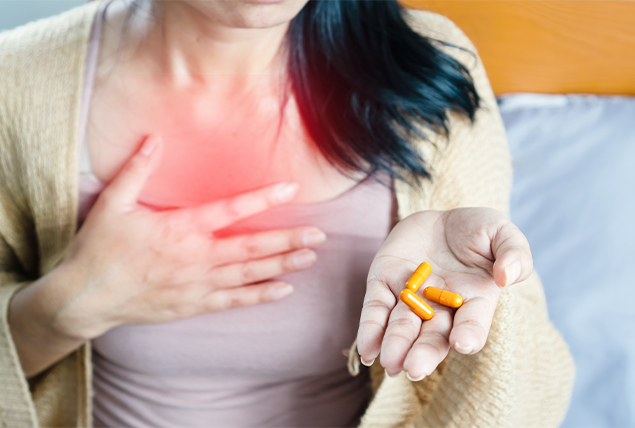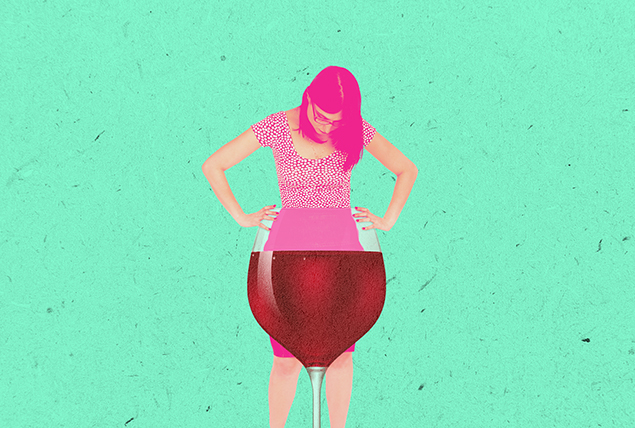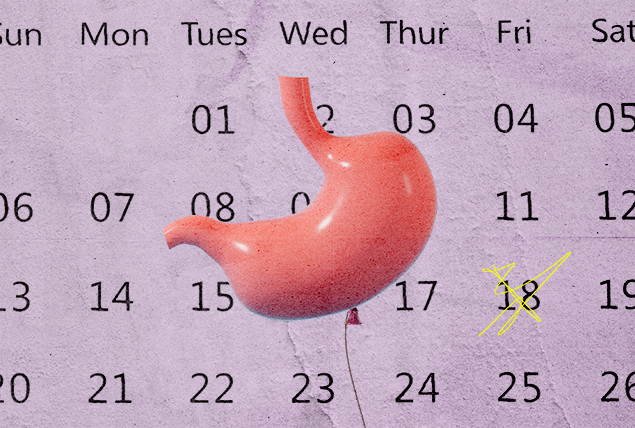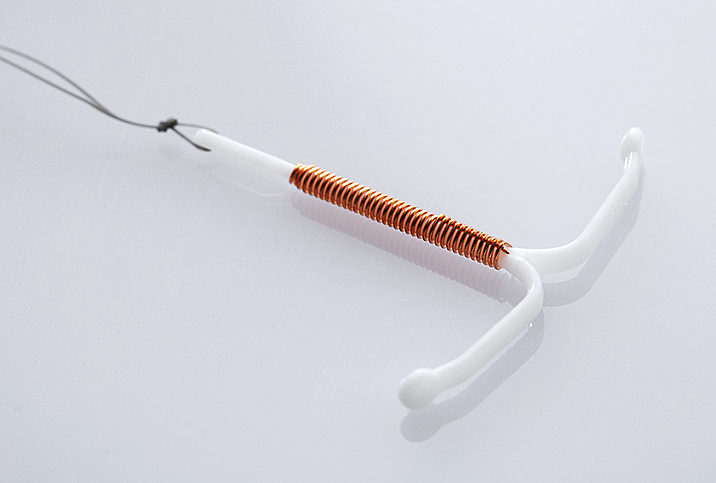Should You Really Be Popping Anti-Bloat Pills?

Feeling bloated after a large meal or bloating during ovulation can be incredibly uncomfortable. You might be tempted to try anti-bloat pills touted by influencers with promises that their favorite pills will relieve your discomfort and allow you to have it all (plus a flat stomach).
But what do medical professionals have to say about this viral alleged health hack? Is there a more natural way to beat the bloat?
What are social media influencers saying about anti-bloat pills?
"We had Arrae bloat pills on every table," said bride Sam Cutler in her "What I Ate On My Wedding Day as a gluten-free, dairy-free, health-focused bride" TikTok video. It has more than 6 million views on the platform.
Cutler got roasted for suggesting her guests needed anti-bloat pills after their dairy-free, gluten-free and sugar-free meal.
She is not the first influencer to promise followers they won't feel bloated if they use a magic pill, tea or powder.
Hailey Bieber shared a shot of one of these brands' PR boxes on her Instagram story with the text, "Seriously can't travel anywhere without these."
Kourtney Kardashian's brand Lemme just launched Lemme debloat daily digestive gummies.
A dozen more brands are hawking a pill, tea or debloat powder. Many influencers promise anti-bloat pills can aid weight loss, without ever mentioning any potential side effects.
What causes bloating and a distended stomach?
Roughly 10 percent to 25 percent of generally healthy people experience bloating on occasion, according to Cleveland Clinic. A common cause of bloating is a buildup of gas in the digestive tract, which can be triggered by your diet or swallowing air.
"Foods high in fiber or sugar alcohols are known to cause bloating, as are carbonated drinks and dairy products for those who are lactose intolerant," said Krutika Nanavati, R.D.N., a registered dietitian and nutritionist with ClinicSpots in Navi Navi Mumbai, India.
Vitamin or nutrient deficiencies and water retention are other causes of bloating, but it's not just what you put into your body. Eating too quickly, overeating or drinking through a straw can lead to a swollen stomach, Nanavati said.
Stress, hormonal changes, gut health issues, celiac disease, constipation and irritable bowel syndrome (IBS) can also lead to bloating.
Approximately 96 percent of people with IBS symptoms experience bloating, a 2011 study reported. The causes of bloating are not the same for everyone.
If you can't figure out what's making you bloat, try "an elimination diet to identify possible food or drink triggers," said Cesar Sauza, R.D.N., a nutrition specialist at National Coalition Health Care in Los Angeles.
What are anti-bloat pills and supplements?
Anti-bloat pills are marketed as a way to improve digestion and help reduce abdominal bloating.
"The majority of these products contain a blend of herbal ingredients and digestive enzymes and are touted as healthy, natural ways of fixing bloating and other digestive issues," said Kevin Huffman, D.O., CEO and founder of online food shop Bariatric Food Source, in Elyria, Ohio.
These pills usually contain simethicone and activated charcoal to help break down gas bubbles, absorb intestinal gas and reduce symptoms of bloating and flatulence. These supplements might contain herbs traditionally used to alleviate digestive discomfort, such as peppermint or chamomile, Nanavati said.
Do anti-bloat pills actually work to reduce bloating?
A majority of anti-bloat pills are not FDA approved, so the effectiveness of these supplements working as advertised can vary, Huffman said. You might spend money on something that won't work for the cause of your bloating.
"[While these pills] may help with mild cases of bloating caused by diet and lifestyle choices, it's worth noting that there is not enough scientific evidence to support their use for chronic bloating," Nanavati said.
While most anti-bloat pills contain herbal ingredients and digestive enzymes, these supplements are not FDA-approved or subject to rigorous scientific inquiry.
Speak with a licensed medical professional to find the right treatment for your condition, Navatati said. There could be a reason behind your frequent bloat.
Not all anti-bloat pills are the same. Some target bloating by reducing stomach acid. The most common ingredient in these supplements is usually simethicone, which commonly alleviates bloating caused by gas by removing gas bubbles in the gut.
Other active ingredients in these pills might include digestive enzymes to help reduce bloating, such as papain, bromelain or lactase. These enzymes are naturally found in foods such as papaya and pineapple.
Some anti-bloat pills are laxatives or contain natural supplements such as peppermint, activated charcoal and ginger, which can help if the bloating is caused by constipation, Sauza said.
What are the potential side effects of anti-bloating pills for gas relief?
Consult with your physician before taking anti-bloat pills for bloating relief, as some of the ingredients in these supplements might not be safe for individuals with certain conditions, Huffman said. Some medications may not work well with supplements for bloating.
Potential side effects of anti-bloat pills depend on the specific product and the ingredients.
"Carefully read the label to see if there are certain ingredients you may have an adverse reaction to," Huffman said. "It's important to research each particular ingredient to discover its associated potential side effects."
Bloating can be triggered by diet, stress, hormones, or vitamin and nutrient deficiencies, but the cause of a distended stomach is not the same for everyone.
These pills are generally considered safe for short-term use when taken as directed. But common ingredients in anti-bloat pills, such as simethicone and activated charcoal, have been known to cause diarrhea and constipation when taken in high doses.
Using antacids to relieve bloating long-term can lead to severe problems, such as bone density issues and esophageal cancer, Sauza said.
"If you suffer from frequent bloating, talk to your doctor first before trying any type of supplement or pill. They will be able to recommend a treatment plan tailored to your individual needs and help you get back on track with your digestive health," Nanavati said.
Do vitamins help with bloating?
"When taken in recommended doses, vitamins can provide essential nutrients needed for proper digestive health," Nanavati said.
One example is vitamin B12. It produces hydrochloric acid (HCI) in the stomach, which breaks down food and stimulates the release of digestive enzymes, which can help support healthy digestion and alleviate bloating, according to Nanavati.
Vitamins help with all of our bodily functions, including digestion. Vitamin D, in particular, has been shown to help support our gut microbiome, which promotes healthy digestion, according to Sauza.
What vitamin deficiency causes stomach bloating?
"A lack of certain essential vitamins and minerals in the body may cause bloating due to an imbalance in your gut bacteria or an inability to properly absorb nutrients from food," Nanavati said.
These nutrient deficiencies, according to Nanavati, could include the following:
- B12
- Magnesium
- Iron
- Vitamin D
- Zinc
- Potassium
What vitamins cause gas and bloating?
Multivitamins and iron are common supplements that can lead to GI issues such as constipation or gas. Consuming more water and fiber can help.
Biotin, riboflavin and niacin can increase gas production in the intestines and lead to bloating.
"Fat-soluble vitamins A, D, E and K are stored in the body's fatty tissues and can lead to an accumulation of gas if these vitamins are not processed properly," Nanavati said.
How can you get rid of bloating naturally?
If you're looking for how to reduce bloating in minutes, you won't find a way. The process of relieving bloating takes longer.
But you can try the following home remedies, according to Sauza:
- Remove trigger foods, which are often processed or junk foods.
- Take probiotic supplements to restore gut health.
- Engage in physical activity to help digestive motility, which can eliminate the feelings of bloating and gas.
Food and drinks that help with bloating, according to our sources, include the following:
- Tea that helps with bloating, such as peppermint and chamomile
- Probiotic-rich foods such as yogurt and fermented products to boost the gut's microbiome
- A balanced diet with plenty of fruits, vegetables, legumes, nuts and seeds
- Herbs such as peppermint leaves, ginger root or cumin seeds
- Plenty of fluids to help keep your digestive system functioning properly
If you tend to eat large, heavy meals, switch to eating smaller meals throughout the day.
Avoid foods high in fat, sugar or sodium; limit carbonated beverages and alcohol; avoid beans and cruciferous vegetables such as cabbage and broccoli; and be wary of onions, garlic and spicy foods, which can be difficult to digest, according to Nanavati.
"Improving and maintaining a healthy gut microbiome should come before any pills," Sauza said.
Speak to your doctor to ensure your bloat isn't due to a medical condition.
What are other ways to reduce bloating?
There are different types of anti-bloating medicine, such as gas relief pills. If you feel your bloating is caused by gas and not inflammation from certain foods or carbonated beverages, then you might want to try an over-the-counter gas relief supplement, Nanavati said.
Gas relief medication and anti-bloat pills may treat different types of symptoms.
The active ingredient in anti-bloat medication is typically simethicone, which acts as an anti-foaming agent to reduce gas bubbles in the stomach and intestines. Gas relief supplements usually contain an antacid, such as simethicone or aluminum hydroxide, to neutralize stomach acid and help reduce gas-causing bacteria.
Always check with your doctor before taking any medication, especially if your condition involves other symptoms.
When should you see a doctor for bloating that won't go away?
Bloated stomach and feeling sick? Seek medical advice if you have the following symptoms:
- Stomach or abdominal pain
- Vomiting
- Diarrhea
- Nausea
- Fever
- Loss of appetite
This is especially important if your bloating comes with pain, persistent heartburn and nausea, according to Nanavati.
"Bloating can sometimes be a symptom of an underlying serious condition that requires immediate medical attention," Huffman said.
If you find your bloating or other GI symptoms have become chronic, see a doctor.
"Bloating and gas should be improved after a couple of months of food avoidance or taking a probiotic," Sauza said.
After seeing your doctor and finding out the right combination of diet, exercise, and vitamins and supplements, your bloating should reduce naturally, Nanavati said. There is no reason to wait.
The bottom line
Bloating can be triggered by diet, stress, hormones, or vitamin and nutrient deficiencies, but the cause of a distended stomach is not the same for everyone. While most anti-bloat pills contain herbal ingredients and digestive enzymes, these supplements are not FDA-approved or subject to rigorous scientific inquiry.
Always consult with a licensed medical professional and research the ingredients. There are natural alternatives that can potentially help provide gas and bloating relief, but if you have other symptoms or it becomes chronic, see a healthcare professional.


















